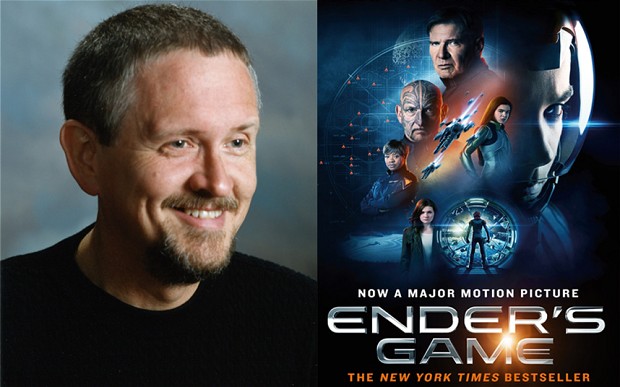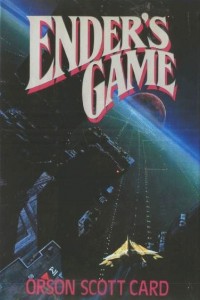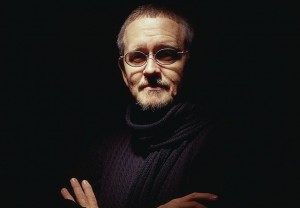Editor’s note: Deadshirt.net staunchly opposes author Orson Scott Card’s hateful stance against homosexuals and marriage equality, and so does this piece, as you’re about to find out. We respect any individual’s choice to boycott the author, his novels, or the new film adaptation of Ender’s Game. What follows is one writer’s account of her personal struggle to reconcile her love for a work of fiction with her distaste for its creator.
Orson Scott Card has an amazing speaking voice. It’s deep and clear, and bright as polished brass. It’s not the kind of voice that commands attention; rather, it simply attracts it. Ears prick to its timbre like moths to a porchlight. In a packed lecture hall, Mr. Card’s voice rang out against absolute silence as his audience listened, rapt.
I’d heard this voice before, on my well-worn audiobook tapes of Ender’s Game and Ender’s Shadow. Card likes to include a personal afterword on all his audiobook releases, which he records unscripted, a live interview with himself. I always loved these afterwords, and listened to them over and over like a favorite chapter. Card spoke about his inspiration for the series, his writing methods, and his decades-long struggle to create the perfect film adaptation of Ender’s Game. He was personal, he was funny, and he was inspiring. I loved him the way only an eleven-year-old can love a favorite author: with the unquestioning adulation of the evangelical.
Listening to him speak at an interview event for the 2013 Los Angeles Festival of Books, I was reminded of those worshipful days, before I grew a bit older and learned about some of Card’s less savory qualities. His voice was even more impressive in person. It radiated assurance and intelligence, and I couldn’t help but feel a twinge of that same awe I had for him as a kid.
But that feeling was quickly extinguished by my horror at what he was saying.
“Before we get any further with questions,” he said, eyes crinkling in a smile, “I’d like to say a few words about my stance against the homosexual agenda.”
A few, but not many, whispers rippled through the crowd. Card smiled wider. “I’m not here to talk about my political views. I’m sure many of you have come to ask such questions. But I will not spend my time defending myself from baseless accusations about my moral integrity.”
No, Card does not believe in gay marriage, he continued. Yes, he sees the fight for “gay rights” (air quotes) as marking the downfall of democracy. No, he said, he is not a homophobe—that word makes it sound like something is wrong with him—and yes, he believes in equality for everybody. He simply is against this one little issue that everybody seems to have such a problem with, and suddenly that’s all anyone wants to talk about.
“Now,” he said, clasping his hands and leaning forward, “shall we get on with the interview?”
I stayed for a bit more. He told a few tales of the journey to get Ender’s Game on the big screen—stories I recognized almost verbatim from his audiobooks. He doled out advice to aspiring writers. He talked about his newest comic book project.
I wanted to stay because I had brought my childhood copy of Ender’s Game (the actual book, this time) for him to sign. It was my oldest copy, stained and dog-eared, with my name scrawled and misspelled on the inner front cover. So what if I didn’t agree with the guy’s political beliefs, I figured. It’d still be cool to get the book autographed. I could give it to my own kid one day, and she’d be wide-eyed at such a treasure.
Listening to Card answer questions about Harrison Ford and movie sequels, I grew more and more agitated. The pitch of his voice, which had once seemed so inviting, now struck me as smug and manipulative. I grimaced as the audience laughed at the same jokes I used to laugh at on my decade-old-audiobooks. For the first time I noticed the ego in the jokes, and their self-congratulatory smarm.
Distracted in my own thoughts, I was brought back to the interview by a sudden change in the tone of Card’s voice. He sounded angry. I realized I had missed a question that had been asked to him, by a young woman who still stood with the microphone in her hand. Card’s smile was gone, and he spoke coldly.
“The message of Ender’s Game has nothing to do with homosexuality,” he was saying. “The book deals with themes of tolerance, but it does not espouse tolerance for those who live in sin. I believe that homosexuality is sin. What’s so hard to understand about that? Why does it matter so much to you people? Why am I always made out to be the bad guy here?”
Is it too dramatic to say that Orson Scott Card is the first hero who ever really failed me? Because that’s certainly what it felt like. It may be unfair to Card to blame him for this betrayal, but I can’t help it. Every former lonely kid has that one movie or book or video game they cite as “the thing that got them through it,” that one world they would turn to again and again when the real world wouldn’t have them. Well, shit, Ender’s Game was mine. I wish it had been something cooler, but you don’t get to pick. And it turned out that the man who created my lonely-kid sanctuary also just happened to stomp on everything else I believed about goodness and human decency.
I left the lecture, clutching my book to my stomach as if I were ill. Outside the building I sat with it, turning it over in my hands, trying to reconcile my abiding love for its content with my revulsion toward the man I just encountered. For a moment I considered tossing the book away, but just as quickly I was overcome with guilt and squeezed it apologetically. I patted its cover reassuringly. It’s not the book’s fault its author is so shitty.
Because maybe the greatness of art is that it does not belong to the artist. Once created, it is no longer static: it can become anything, to anyone. Ender’s Game is a brilliant, sensitive novel—I thought so before I learned about its author’s politics, and I think so now. In the end, the person who wrote it is less relevant than what it’s about, or how it made me feel. The story exists in and of itself, by virtue of myself and the millions of other readers who read and loved it without ever engaging with Card’s dogma.
I have tickets to see the film adaptation of Ender’s Game in theaters later this week, and I am psyched as all hell. There’s been a lot of buzz about boycotts and controversy over Card, but I’m not bothered by it. I’ve already made my peace with the man, and the way I see it, this film has nothing to do with him. A beautiful thing made by an ugly person is still a beautiful thing. And besides, Ender’s Game belongs to me now.





I loved the description of his voice transitioning between giving off comfort and giving off smarm. I expected this to go into darker territory, but I like the note that it ended on… authors can turn out to be terrible people, but they can never take back what you took from them.
It is always sad to see/hear your heroes remix something you thought was off-the-cuff or unrehearsed. That he would still be regurgitating stuff he committed to cassette over a decade ago, well, there’s such a Spin-Doctors-playing-the-county-fair quality to it. Not to even mention the icky intolerance.
That “one thing that gets through” in my case was the comedy album CLASS CLOWN by George Carlin. Luckily for me, if anything, throughout my life, Carlin doubled-down on the skepticism/agnosticism/relativism that so cliqued with my 12 year old brain.
Most people who take a stance like this are deeply in the closet. Stay tune for Mr. Card’s future outing because it will happen.
I think that this post was very well put. We have to learn to separate authors from their works. Many people have different, and sometimes alarming, world perspectives…but, it’s what makes us all different. And, as you said, does not make them incapable of producing something beautiful. In fact, I find that wonderful to think that everyone is capable of giving the world beauty.